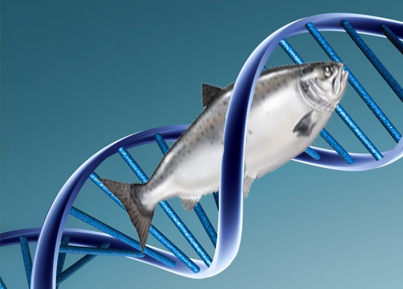- Like
- Digg
- Tumblr
- VKontakte
- Buffer
- Love This
- Odnoklassniki
- Meneame
- Blogger
- Amazon
- Yahoo Mail
- Gmail
- AOL
- Newsvine
- HackerNews
- Evernote
- MySpace
- Mail.ru
- Viadeo
- Line
- Comments
- SMS
- Viber
- Telegram
- Subscribe
- Facebook Messenger
- Kakao
- LiveJournal
- Yammer
- Edgar
- Fintel
- Mix
- Instapaper
- Copy Link
Even though American’s overwhelmingly oppose genetically engineered meat, the US Food and Drug Administration (FDA) may soon approve the first-ever genetically modified animal for human consumption: a GMO salmon under the trade name AquAdvantage.
These genetically engineered fish are manipulated to grow twice as fast so they reach market weight in half the time. How? Genes from two other fish are inserted into their DNA. As you might imagine, beneath the surface, this poses very serious animal welfare, environmental, and human health concerns.
Not only will these animals be crammed inside overcrowded, filthy tanks on aquaculture factories, some of these non-native fish may escape, putting wild salmon populations at risk. To make matters more alarming, the FDA is reviewing AquAdvantage salmon through its “New Animal Drug Approval” process. Apparently, the fish themselves are considered drugs.
If the FDA approves GMO salmon for human consumption, there is a strong likelihood it will set a precedent, making future approvals of genetically engineered meat even easier. That’s why it’s vital to take action now.
The FDA is currently accepting public comments on this important issue. Please email the FDA today, letting the agency know that you oppose the approval of GMO fish.
Feel free to use this sample letter when contacting the FDA:
Re: FDA-2011-N-0899: I am writing because I’m deeply concerned that the FDA is on the verge of approving genetically modified salmon. I’m urging you to prepare a full environmental impact statement (EIS) regarding AquaBounty’s requested approval. I remain unconvinced that genetically engineered fish is safe for human consumption and I’m disturbed by the environmental and animal welfare impact that would result from expansion of this project. Additionally, I’m quite alarmed at the prospect of genetic engineering of other farmed animals and by the ease with which this might be approved if the FDA allows this initial project to move forward.

